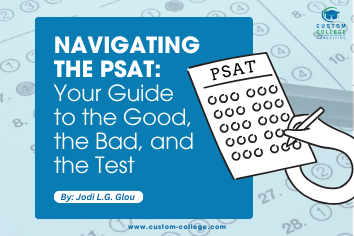Is Your High School Transcript Ready for College? Why Graduation Requirements Aren’t Enough!
As high school students work through their graduation requirements, they often assume that meeting these basics will also satisfy college admissions expectations. However, the minimum standards required for high school graduation often fall short of what competitive colleges look for in applicants. Understanding these differences can be key to crafting a high school experience that not only meets graduation standards but also enhances your college application. Here’s a closer look at the contrast between high school graduation requirements and college admissions preferences.
Graduation Requirements: The Basics
High school graduation requirements cover a core set of subjects designed to ensure a baseline level of education. Typically, this includes four years of English, three to four years of math (often through Algebra II), two to three years of science (including Biology and Chemistry), three to four years of social studies (covering areas like U.S. History and World History), and, in many cases, one to two years of foreign language. Electives, including courses in arts and technology, round out the curriculum, aiming to offer students a well-rounded education. While these are essential for earning a diploma, colleges often seek students who go beyond these basics, showing additional commitment and readiness for college-level work in critical areas.
College Admissions Expectations: Going Beyond the Basics
College admissions expectations tend to emphasize both rigor and specialization. For example, while four years of English is a high school standard, colleges value students who develop strong writing and analytical skills by taking advanced English courses emphasizing literature, research, and essay writing. Honors or AP English classes can demonstrate a student’s capacity for in-depth analysis and nuanced writing—skills highly valued across disciplines. Similarly, many selective colleges in math prefer applicants who progress beyond Algebra II, ideally completing Pre-Calculus or even Calculus. This demonstrates both readiness for quantitative reasoning in college coursework and perseverance in tackling more challenging material.
In the sciences, colleges typically look for a minimum of three years of lab sciences, covering Biology, Chemistry, and Physics. Taking advanced science classes (such as AP or IB Biology, Chemistry, or Physics) can be particularly advantageous for students interested in STEM fields, as it signals both academic rigor and dedication. While high schools may require three years in social studies, colleges often appreciate applicants with four years, including advanced coursework like AP U.S. History, World History, or Government. These courses emphasize critical thinking, analytical writing, and a deeper understanding of historical contexts.
Foreign language requirements can also be an area of distinction between high school and college expectations. Many colleges prefer students who have studied the same foreign language for at least two to three years, with some selective schools seeking four years. This commitment level demonstrates cultural awareness and a willingness to pursue subjects that require cumulative skill-building. Lastly, while high school graduation may only sometimes mandate fine arts courses, colleges value creativity and self-expression, encouraging students to engage in the arts, music, or technology. For those interested in the arts, a portfolio or coursework in related fields can strengthen a college application.
Building a Competitive Transcript
To build a transcript that meets and exceeds college expectations, aim to take advanced or honors classes in core subjects whenever possible. Consistency is key, as it demonstrates growth and dedication. If you’re targeting specific fields, such as engineering, pre-med, or the arts, bolster your transcript with relevant courses that show your commitment to that area. Planning for standardized tests early, especially if you’re taking advanced coursework, can also give you an edge.
A Strategic Approach
Creating a high school plan that aligns with both graduation and college admission goals can feel overwhelming, but Custom College Consulting is here to help. Together, we can assess your academic standing, create a strategic course plan, and ensure you’re prepared to meet high school and college requirements. Contact us today to start building a competitive transcript and pave your way to college success.










